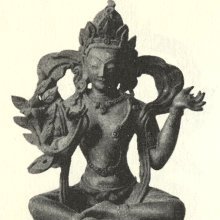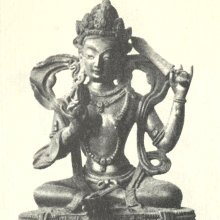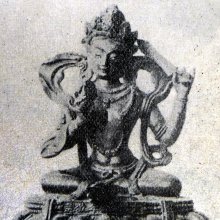Pranidhana, Praṇidhāna: 17 definitions
Introduction:
Pranidhana means something in Buddhism, Pali, Hinduism, Sanskrit, Marathi, Hindi. If you want to know the exact meaning, history, etymology or English translation of this term then check out the descriptions on this page. Add your comment or reference to a book if you want to contribute to this summary article.
Alternative spellings of this word include Pranidhan.
Images (photo gallery)
In Buddhism
Mahayana (major branch of Buddhism)
Source: Wisdom Library: Maha Prajnaparamita SastraPraṇidhāna (प्रणिधान) refers to “buddhist vow” according to the 2nd century Mahāprajñāpāramitāśāstra chapter X. During innumerable kalpas of this kind (asaṃkhyeyakalpa), the Bodhisattva has formed the great vow to save all beings. This is what is called the vow of the Great Mind. In order to save all beings, the fetters (saṃyojana) must be cut through and supreme perfect enlightenment (anuttara-samyak-saṃbodhi) must be realized. This is what is called vow (praṇidhāna).
Source: academia.edu: A Study and Translation of the GaganagañjaparipṛcchāPraṇidhāna (प्रणिधान) refers to “aspirations”, according to the Gaganagañjaparipṛcchā: the eighth chapter of the Mahāsaṃnipāta (a collection of Mahāyāna Buddhist Sūtras).—Accordingly, “Son of good family, the morality of the Bodhisattvas becomes purified by these eight qualities. What are those eight? To wit, (1) never giving up the thought of awakening in order to purify thought ; (2) no thought of disciples or isolated buddhas in order to purify logical ability; (3) never giving up training in order to purify one’s vows; (4) not entering into any kind of birth in order to [purify?] one’s aspirations (praṇidhāna-pariśuddhi); (5) no laxity in order to purify the condition of non-stress; (6) transforming into awakening so as to purify one’s aim’”.

Mahayana (महायान, mahāyāna) is a major branch of Buddhism focusing on the path of a Bodhisattva (spiritual aspirants/ enlightened beings). Extant literature is vast and primarely composed in the Sanskrit language. There are many sūtras of which some of the earliest are the various Prajñāpāramitā sūtras.
Tibetan Buddhism (Vajrayana or tantric Buddhism)
Source: OSU Press: Cakrasamvara SamadhiPraṇidhāna (प्रणिधान) refers to the “Bodhisattva vow”, according to Buddhist teachings followed by the Newah in Nepal, Kathmandu Valley (whose roots can be traced to the Licchavi period, 300-879 CE).—In the Hīnayāna the term bodhisattva was only used to refer to a future historical Buddha prior to their attainment of Buddhahood. However, in the Mahāyāna, the term is used to designate anyone who aspires to the complete, perfect enlightenment of themselves and all beings. Motivated by boundless compassion (karuṇā), and tempered by the perfection of wisdom (prajñā), the Bodhisattva generates bodhichitta, "the enlightened mind", which many Buddhists believe to be compassion itself. The Bodhisattva then takes the Bodhisattva Vow (praṇidhāna), receives the promise of future attainment (vyākaraṇa), and proceeds to follow the Bodhisattva Path, including the ten stages (bhūmis). [...]

Tibetan Buddhism includes schools such as Nyingma, Kadampa, Kagyu and Gelug. Their primary canon of literature is divided in two broad categories: The Kangyur, which consists of Buddha’s words, and the Tengyur, which includes commentaries from various sources. Esotericism and tantra techniques (vajrayāna) are collected indepently.
General definition (in Buddhism)
Source: Wisdom Library: Dharma-samgraha1) Praṇidhāna (प्रणिधान, “aspiration”) or Praṇidhānavaśitā refers to the “mastery of aspiration” and represents one of the “ten masteries of the Bodhisattvas” (vaśitā) as defined in the Dharma-saṃgraha (section 74). The Dharma-samgraha (Dharmasangraha) is an extensive glossary of Buddhist technical terms in Sanskrit (e.g., praṇidhāna). The work is attributed to Nagarjuna who lived around the 2nd century A.D.
2) Praṇidhāna (प्रणिधान) or Tripraṇidhāna refers to the “three kinds of aspirations” as defined in the Dharma-saṃgraha (section 112):
- susthāna-prābandhika (bound to the beautiful),
- sattvārtha-prābandhika (bound to the welfare of beings),
- buddhakṣetra-pariśodhaka (purifying the Buddha-field).
Languages of India and abroad
Marathi-English dictionary
Source: DDSA: The Molesworth Marathi and English Dictionarypraṇidhāna (प्रणिधान).—n S Fixing or settling (the mind) at or in; i. e. contemplation or meditation.
Marathi is an Indo-European language having over 70 million native speakers people in (predominantly) Maharashtra India. Marathi, like many other Indo-Aryan languages, evolved from early forms of Prakrit, which itself is a subset of Sanskrit, one of the most ancient languages of the world.
Sanskrit dictionary
Source: DDSA: The practical Sanskrit-English dictionaryPraṇidhāna (प्रणिधान).—
1) Applying, employing, application, use.
2) Great effort, energy.
3) Profound religious meditation, abstract contemplation; सोऽपश्यत् प्रणिधानेन संततेः स्तम्भकारणम् (so'paśyat praṇidhānena saṃtateḥ stambhakāraṇam) R.1.74;8.19; V.2; तपःस्वाध्यायेश्वरप्रणि- धानानि क्रियायोगः (tapaḥsvādhyāyeśvarapraṇi- dhānāni kriyāyogaḥ) Pātañjala S; ईश्वरप्रणिधानाद्वा (īśvarapraṇidhānādvā) Pātañjala S. 23.
4) Respectful behaviour towards (with loc.); जानामि प्रणिधानं ते बाल्यात् प्रभृति नन्दिनि । ब्राह्मणेष्विह सर्वेषु गुरुबन्धुषु चैव ह (jānāmi praṇidhānaṃ te bālyāt prabhṛti nandini | brāhmaṇeṣviha sarveṣu gurubandhuṣu caiva ha) || Mahābhārata (Bombay) 3.33.19.
5) Renunciation of the fruit of actions (karmaphalatyāga).
6) Entrance, access.
7) (With Buddhists) A prayer, an entreaty.
Derivable forms: praṇidhānam (प्रणिधानम्).
Source: Cologne Digital Sanskrit Dictionaries: Edgerton Buddhist Hybrid Sanskrit DictionaryPraṇidhāna (प्रणिधान).—nt. (m. modifiers Bhadracarī 58; = Pali paṇidhāna; like praṇidhi, n. act. to praṇidadhāti, praṇidheti), fixation of mind (ceto-pra° Mahāvastu i.239.5; iii.138.19; Pali ceto-paṇidhi), and so ardent desire, earnest wish, vow; sometimes (but rarely) of purely worldly desires, which are reprobated, praṇidhāna-vivarjitam Saddharmapuṇḍarīka 142.8 (verse); usually religious at least in basis, fulfilment being expected on the ground of acts of merit, which are often mentioned in a solemn declaration of wish; the thing desired may nevertheless be worldly (wealth, or special marks of grace), tho often the intention is stated to use it for religious-purposes: Mahāvastu i.302.19 (magic possession of garlands); iii.414.12 (fortunate rebirths); Divyāvadāna 23.17; 65.10 (to become a cakravartin); or it may be truly religious, yet not Buddhahood or Bodhisattvahood, Saddharmapuṇḍarīka 242.4 (here made by a past Buddha, to do services to Buddhas to come); most commonly to win enlightenment, i.e. to become a Buddha, Saddharmapuṇḍarīka 43.12; Lalitavistara 31.22 (°na-paripūryai, so with mss.; compare praṇidhi-paripūriye); 180.1; 415.15; Mahāvastu i.39.8; 104.3; 239.5; iii.138.19; Divyāvadāna 66.22; 90.3; Avadāna-śataka i.8.12; praṇidhāna-caryā, a whole course of praṇidhānas, Mahāvastu i.1.3, see s.v. caryā; when made by a Bodhisattva it may mean rather the vow to follow the Bodhisattva-course, and may then be called specifically caryā-pra° Saddharmapuṇḍarīka 64.13, 14, or bhadracarī-pra° Bhadracarī 2, etc.; praṇidhāna is one of the ten bala of a Bodhisattva, Mahāvyutpatti 764, and one of his vaśitā, Mahāvyutpatti 778; anuloma-pra° Mahāvastu i.1.11, continued successive pra°, seems to mean a pra° repeated by the same individual (Śākyamuni in previous incarnations as cakravartin), in similar terms, as described later in i.48.17 ff.; there are ten mahāpraṇidhāna of a Bodhisattva, Daśabhūmikasūtra 14.15 ff., described at length (ten such are referred to in Asaṅga (Mahāyāna-sūtrālaṃkāra) iv. 12, but the list quoted from another source by Lévi, note to Transl., is quite different from the Daśabhūmikasūtra list); four pūrva-praṇidhāna-padāni Lalitavistara 204.16, each described in the sequel in an entire paragraph; three kinds of pra° Dharmasaṃgraha 112, viz. susthāna-prābandhikam (see prāban- dhika), sattvārtha-prābandhikam, buddhakṣetra-pariśo- dhakam. Rarely prārthanā, q.v., appears to be used of the ‘earnest wish’ for enlightenment.
Source: Cologne Digital Sanskrit Dictionaries: Shabda-Sagara Sanskrit-English DictionaryPraṇidhāna (प्रणिधान).—n.
(-naṃ) 1. Great effort, stress, energy. 2. Profound religious meditation. 3. Access, entrance. 4. Respectful behaviour. 5. Application, use. 6. Renunciation of the fruits of actions. E. pra and ni and prefixed to dhā to have, aff. lyuṭ .
Source: Cologne Digital Sanskrit Dictionaries: Benfey Sanskrit-English DictionaryPraṇidhāna (प्रणिधान).—i. e. pra-ni -dhā + ana, n. 1. Putting on, employing. 2. Respectful behaviour, attendance to, Mahābhārata 3, 17016. 3. Profound meditation, [Vedāntasāra, (in my Chrestomathy.)] in
Praṇidhāna (प्रणिधान).—[neuter] laying on, applying, employment, endeavour, effect; consideration, attention or submission to (—°); meditation, devotion.
Source: Cologne Digital Sanskrit Dictionaries: Monier-Williams Sanskrit-English Dictionary1) Praṇidhāna (प्रणिधान):—[=pra-ṇidhāna] [from praṇi-dhā] n. laying on, fixing, applying (also [plural]), [Caraka; Suśruta]
2) [v.s. ...] access, entrance, [cf. Lexicographers, esp. such as amarasiṃha, halāyudha, hemacandra, etc.]
3) [v.s. ...] exertion, endeavour, [Saddharma-puṇḍarīka]
4) [v.s. ...] respectful conduct, attention, paid to ([locative case]), [Mahābhārata]
5) [v.s. ...] profound religious meditation, abstract contemplation of ([compound]), [Raghuvaṃśa; Kathāsaritsāgara; Vedāntasāra]
6) [v.s. ...] vehement desire, [Lalita-vistara]
7) [v.s. ...] vow, [ib.]
8) [v.s. ...] prayer (threefold), [Dharmasaṃgraha 112.]
Source: Cologne Digital Sanskrit Dictionaries: Yates Sanskrit-English DictionaryPraṇidhāna (प्रणिधान):—[pra-ṇi-dhāna] (naḥ) 1. m. Great effort; meditation; access to.
Source: DDSA: Paia-sadda-mahannavo; a comprehensive Prakrit Hindi dictionary (S)Praṇidhāna (प्रणिधान) in the Sanskrit language is related to the Prakrit word: Paṇihāṇa.
[Sanskrit to German]
Sanskrit, also spelled संस्कृतम् (saṃskṛtam), is an ancient language of India commonly seen as the grandmother of the Indo-European language family (even English!). Closely allied with Prakrit and Pali, Sanskrit is more exhaustive in both grammar and terms and has the most extensive collection of literature in the world, greatly surpassing its sister-languages Greek and Latin.
Hindi dictionary
Source: DDSA: A practical Hindi-English dictionaryPraṇidhāna (प्रणिधान) [Also spelled pranidhan]:—(nm) respectful conduct; profound religious meditation; abstract contemplation; prayer.
...
Kannada-English dictionary
Source: Alar: Kannada-English corpusPraṇidhāna (ಪ್ರಣಿಧಾನ):—
1) [noun] a laying on, fixing, applying or placing in a particular manner.
2) [noun] an earnest attempt; an all-out effort; endeavour.
3) [noun] close or fixed attention; concentration.
4) [noun] profound religious meditation;abstract contemplation.
5) [noun] the quality of being not influenced by personal interest or selfish motives and working altruistically.
6) [noun] the fact, quality or state of being devoted to a god, saint or other holy man or object; devotion.
Kannada is a Dravidian language (as opposed to the Indo-European language family) mainly spoken in the southwestern region of India.
See also (Relevant definitions)
Partial matches: Pra, Dhana, Nidhana, Pranin, Tana.
Starts with: Pranidhanabala, Pranidhanacarya, Pranidhanaparamita, Pranidhanaparipurana, Pranidhanasagaraprabhasashiri, Pranidhanasagaraprabhasashri, Pranidhanavashita.
Ends with: Anulomapranidhana, Apranidhana, Devatapranidhana, Dushpranidhana, Ishvarapranidhana, Mahapranidhana, Mithyapranidhana, Parameshvarapranidhana, Purivapranidhana, Sampranidhana, Samyakpranidhana, Supranidhana, Tripranidhana.
Full-text (+39): Mithyapranidhana, Panihana, Buddhakshetraparishodhaka, Bhadracari, Anulomapranidhana, Vasita, Abhisambuddhana, Mahapranidhana, Parameshvarapranidhana, Ishvarapranidhana, Panidhana, Paramita, Samyakpranidhana, Devatapranidhana, Pranidhan, Pranidhanavashita, Carya, Tripranidhana, Gunagana, Prarthana.
Relevant text
Search found 32 books and stories containing Pranidhana, Pra-nidhana, Pra-ṇidhāna, Prani-dhana, Praṇi-dhāna, Praṇidhāna; (plurals include: Pranidhanas, nidhanas, ṇidhānas, dhanas, dhānas, Praṇidhānas). You can also click to the full overview containing English textual excerpts. Below are direct links for the most relevant articles:
Yogadrstisamuccaya of Haribhadra Suri (Study) (by Riddhi J. Shah)
Chapter 4.2b - Niyama (restraint of the mind) < [Chapter 4 - The Eight Yogadṛṣṭis and the nature of a Liberated Soul]
Chapter 3.5 - Introduction and Brief Account of the Eight Yogadṛṣṭis < [Chapter 3 - Introduction to the Yogadṛṣṭisamuccaya]
Jainism and Patanjali Yoga (Comparative Study) (by Deepak bagadia)
Part 4.4 - Yogic techniques for control of Vrttis (1): Kriyayoga < [Chapter 2 - Yoga philosophy and practices]
Part 4.4 - Yogic techniques for control of Vrttis (5): Isvara-pranidhana < [Chapter 2 - Yoga philosophy and practices]
Ten rituals of the Temple < [Chapter 3 - Jain Philosophy and Practice]
Yoga-sutras (with Bhoja’s Rajamartanda) (by Rajendralala Mitra)
Bhakti-rasamrta-sindhu (by Śrīla Rūpa Gosvāmī)
Verse 2.4.131 < [Part 4 - Transient Ecstatic Disturbances (vyābhicāri-bhāva)]
Maha Prajnaparamita Sastra (by Gelongma Karma Migme Chödrön)
3. Prajñā of the Buddhas and Bodhisattvas < [Part 2 - Prajñā and the prajñās]
Bodhisattva quality 25: an infinite number of buddha-fields < [Chapter XIII - The Buddha-fields]
III. Wisdom, inseparable from concentration < [Part 2 - Surpassing the high concentrations of the Śrāvakas]
Padarthadharmasamgraha and Nyayakandali (by Ganganatha Jha)
Text 121: On Smṛti (Remembrance) < [Chapter 6a - On Qualities]


